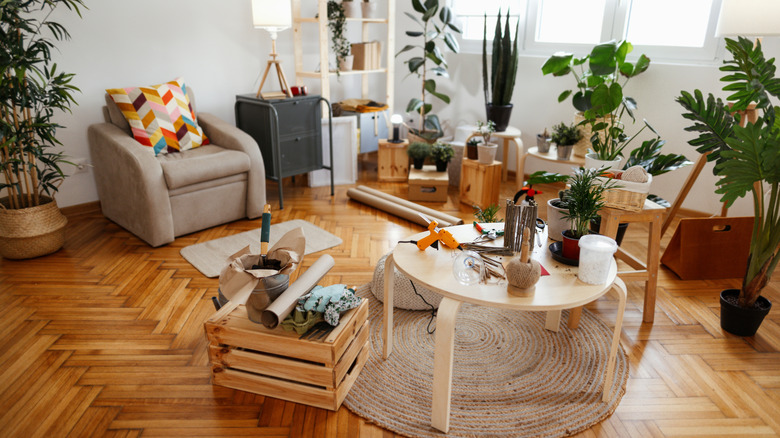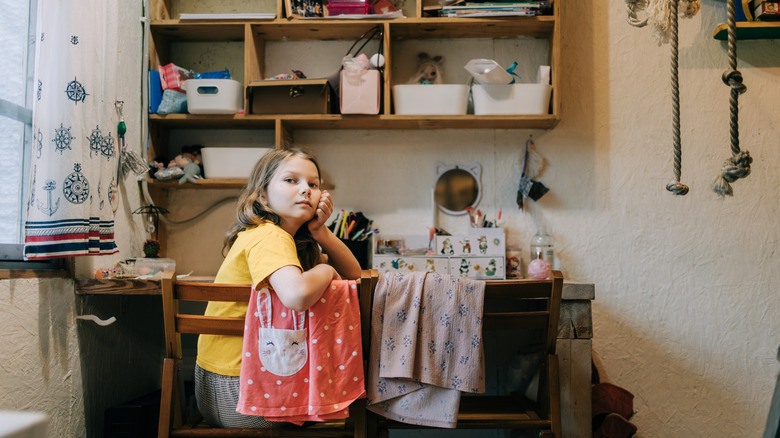The Biggest Sign You're Overdecorating Your Room
Wanna know the biggest giveaway you're overdecorating your room? It's when nothing in particular stands out because everything is busy fighting for attention. This is a big no-no, and you should never overwhelm your guests or yourself with too much to look at. Research even suggests excessive stimuli in a room can have some serious side effects. According to a study published by the Association for Psychological Science, heavily decorated rooms can disrupt attention and impair focus. This is evidence that too much visual clutter isn't just about aesthetics — it can really affect how we think and feel in a space.
Not only will overdecorating make a space uninviting, but the clutter can confuse people and make it difficult to appreciate anything in the room. A well-decorated room should have one good focal point, and if your room lacks that, the eyes of your guests will wander with uncertainty about where they should land. That's a clear sign you have too much decor.
A well-decorated room should have balance, which allows for an appreciation of the design flow of the room without one object overpowering another. Decor should enhance the overall feeling of a room rather than overwhelm it. Too many patterns, objects, and even pieces of furniture can often make a room feel chaotic rather than stylish. Feel like you've overdone it? Try removing items one at a time to see if your space feels more cohesive and calming.
Common mistakes that lead to an overdecorated room
If you can't seem to identify a focal point for your room, then it's more than likely your room is overdecorated. Esther Ellard, founder of Effortless Designs, shared with The Spruce that "I would say a major sign of overdecorating is not being able to see the couch or area rug," and added, "the main pieces of a space have been chosen for a reason and they should not be covered up."
While overdecorating can happen for an assortment of reasons, it can often simply be due to cramming furniture into a limited space. If a room isn't overcrowded with furniture, too many decorative objects can also be a problem. Placing too many cushions or throws on your sofa can be off-putting. An overstuffed room leaves little to no space for your key design elements to breathe.
Another common decorating mistake is incorporating several design styles in one room. This makes it difficult to grasp what's happening in the overall design of the room. Brittny Button, founder of Button Atelier, said, "It comes off as confused or messy looking." This can result in a clashing frenzy, where nothing in the room harmonizes. Designers say it's also important to be critical about your space. Don't hold on to items that have little meaning to you, as it'll lead to clutter.
An overdecorated room's impact goes beyond aesthetics
Do you or a family member easily get overwhelmed in a crowded space? Then you may want to reconsider trying out a statement decor trend in an already decorated room. You might be doing too much, not just aesthetically, but also for your mental health.
Although it is subjective, an overdecorated room can easily be deemed cluttered. While you might not think much of it, excess objects in a room can make the brain struggle to find a place to focus. Your design focal point can disappear in the room, and the clutter can lead to sensory overload. A study by UCLA even found a link between elevated cortisol levels and overly ornamented rooms. Too much of anything can stress the mind out.
A cluttered environment can overwhelm anyone, but if you're already prone to anxiety and stress, the excessive visual distractions may have some negative effects on your brain activity. If you're someone who needs to decompress after long days out and about, it's important to decorate your space for maximum relaxation. Overstimulation is the last thing anyone needs after a stressful day.


